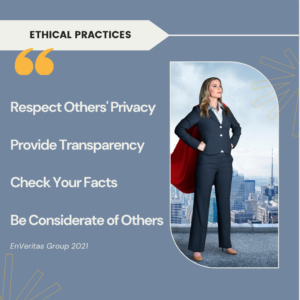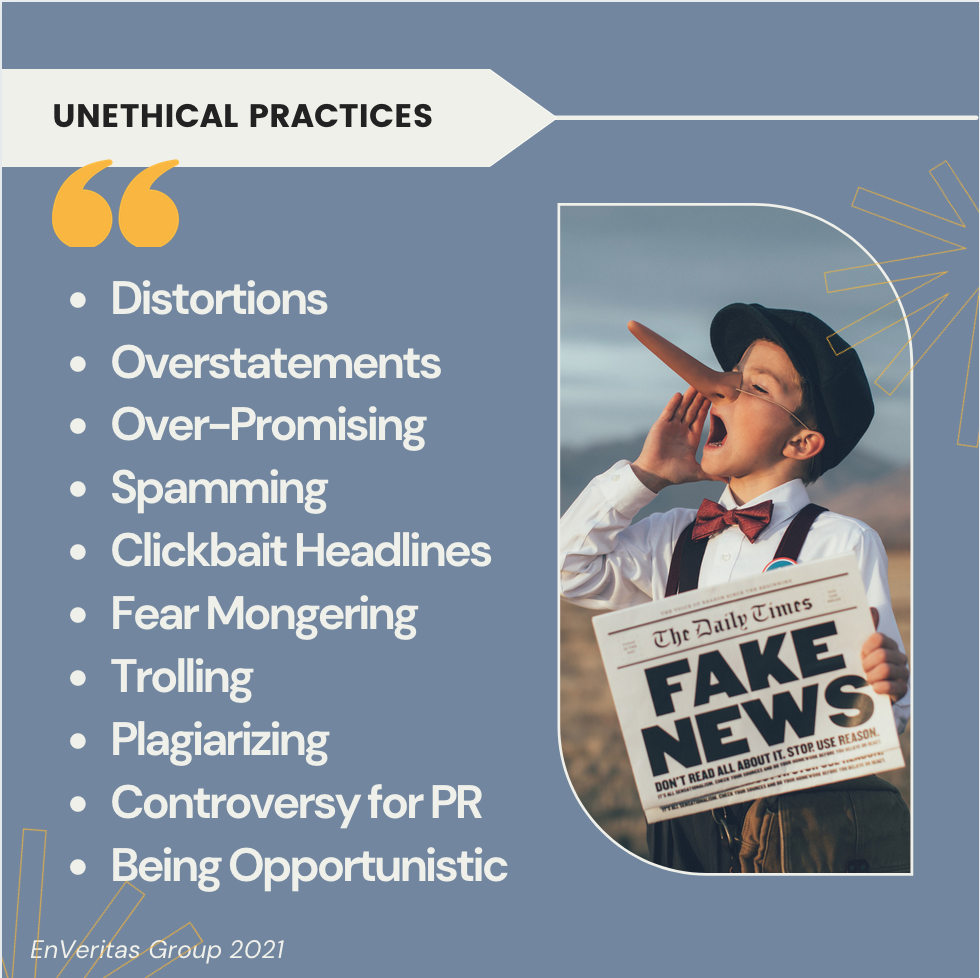Ethical Issues in Content and Social Media Marketing
The past two years have made it clear that what people read online has a direct impact on their lives. Because of that, it’s more important than ever to pay attention to ethical issues in content and social media marketing. Those who choose to be ethical in how they run their social media accounts and in the content they publish create a bond of trust with their audience, leading to a culture of loyalty.
Behaving in an ethical manner through your social media and content isn’t difficult. You just need to follow these four precepts. 
1. Respect Everyone’s Privacy.
If the past few years have taught us anything, it’s that taking privacy seriously is a vital part of ensuring your brand, whether personal or corporate, is trustworthy. On the whole, we are more connected and willing to share more information than ever before. Ransom attacks on businesses in 2021 have risen 400% compared to 2019. Intrusive data harvesting is increasingly a part of behind-the-scenes data collection. Remember the Cambridge Analytica breach involving Facebook, personal data, and US election advertising?
One way you can ensure you’re respecting everyone’s privacy is to adhere to an up-to-date privacy policy that is GDPR compliant.
2. Be Transparent
Advertorial, branded content, sponsored content, or native advertising? If something’s an ad, the ethical thing to do is to acknowledge it’s an ad. Social media and other platforms publish these forms of content alongside their editorial content.
If you are leaving a review and received a free product or the book, acknowledge that in your review. Choose opportunities for advertorials or native advertising with publishers who help readers see the difference between your ad and their editorial content. The more open you are, the more trustworthy you become in your readers’ and followers’ eyes.
3. Check and Report the Facts
While many people laughed at the idea of “alternative facts” regarding the Trump inauguration, fact-checking is important. If you’re reporting statistics, cite them within the context of the original study. As Mark Twain said, “Facts are stubborn things, but statistics are pliable.” Ethical writers avoid skewing stats by presenting the facts and numbers or statistics as transparently as possible.
Reporting truthfully goes a long way toward combating “false news” and building your band’s image up as trustworthy.
Remember, if something seems too good to be true (or too odd to be true), don’t share it. Instead, use one of the many reputable online fact-checkers. It only takes a few minutes to see if it is true or a hoax. The upside is that you’ll also avoid being called out by someone who knows the facts and accuses you of spreading false information.
4. Be Considerate of Others
Everything we write as content producers is intended to influence your audience. Some of your content will be shared. Your content may drive someone to make a purchase. Other people may hire you because they like your content. As an ethical marketer, your goal should be to help every website visitor believe you are a professional. That means being aware of your choice of language and images and how they may impact viewers. What may seem normal to you may be perceived as derogatory or stereotyping by others.
Mark Twain said, “Facts are stubborn things, but statistics are pliable.” EVG has more advice about ethical content marketing.Click to PostBeing an ethical content and social media marketer also means avoiding the following nine types of unethical behavior. 
1. Distorted or Overstated Statements
Just as it’s important to be honest and transparent with your audience about your motives, it’s equally important to be honest about your content. Unethical content might overstate the usefulness of an item, or it can be a glammed up image that bears little connection to reality. If you distort the camera angle to make a room seem larger for a real estate ad or if you make promises you can’t fulfill, you’re lying to your audience. Chances are high your audience will see through your false statements and you’ll lose credibility.
2. Avoid Over-Promising and Under-Delivering
We get it. It’s tempting to try and make everybody happy. We want to showcase our products in the best way possible. We want to make ourselves look good. Fast delivery? You bet. (Unless we get busy.) Free shipping? Sure. (But only if you buy another $100 worth of goods.) Most people know that if it sounds too good to be true, it probably isn’t. But if you’re following ethical practices in marketing, you need to avoid over-promising. Disappointing those who want to believe in you and what you’re selling will leave you with a bad reputation.
3. Don’t Indulge in Spam
We’ve all seen those Twitter accounts that post nonstop urging people to go to their website. Our inboxes fill up with unsolicited email for spurious, shady offers. And we all know that friend who’s selling something on their social media account and losing sight of the social part. Most people simply unfollow these brands and friends. So it’s important that you check your own practices. Are you only talking about yourself on social media as a brand? That’s not a conversation. Are you sending a flood of email with little engagement and too few clicks? That’s a sign you’re being a pest, not a partner.
The ethical approach is to be clear about how often you’ll send email when someone signs up for it on your website. On social media, keep the conversation focused on your audience, with only occasional self promotion. If you insist on focusing solely on your brand and/or products, find an angle that resonates with your audience.
4. Don’t Write Clickbait Headlines
We’ve all gone down the rabbit hole when we spotted an intriguing or outlandish claim. We want to know the secret or see the hidden photos. But because of the proliferation of clickbait headlines, we’re also becoming smarter about it. Moreover, if your headline is too much like clickbait, Facebook and other social media platforms are more aggressive about marking it as spam or fake news.
Ethical writers are fully capable of crafting clever and honest headlines. The bonus? That approach will rank better in search.
5. Don’t Engage in Fear-Mongering
COVID vaccines make you magnetic. Toilet paper is being rationed. Death panels decide if you live or die. Statements intended to scare the reader into taking action are unethical. Using fear to motivate is not only dishonest, but it means your content is subject to fact-checking, being banned, or other types of sanctions. There are times when you do need to share information that may be perceived as scary. This is the time to insist on a tactful and sensitive approach. And don’t forget to provide credible sources to help your readers understand the full context. This approach will help you gain the trust of your audience.
6. Avoid Being a Troll or Blasting
Defamation, libel, and slander lawsuits are very real. And if you let it all out online, you may face one. There are many who’ve given in to the temptation to publicly bash a business, insult an individual over a perceived action, or simply lie in a review. But the consequences can last longer than that hasty tweet or jotting a fake review. Law firms are winning cases based on social media defamation.
If you find yourself reaching the breaking point, jot your thoughts down on a notepad, rip it up, and put it in the trash. Then step away from social media until it’s in your rear window.
7. Don’t Plagiarize
This should go without saying, but plagiarism happens all too often. You might write a great article, and someone else posts it on their site as theirs. Or someone grabs a photo off a search engine and uses it without permission. Or someone buys a photo from iStock and uses it without regard to the type of license it carries. Even simply quoting a source without attribution is an ethical issue.
Sharing images, funny memes, and articles can be part of an ethical content marketing approach. But when you do share another person’s work, give them visible credit. Know the rules of Creative Commons licensing and credit all of your sources. Both the author and your audience will appreciate it.
8. Don’t Use Controversy for Publicity
The idea that there’s no such thing as bad publicity is often attributed to P.T. Barnum. And in the realm of movies, books, and newspapers, it’s understood that controversy sells. But if your business isn’t within that world, then creating controversy for the sake of free publicity is just plain wrong. And it’s unethical. You run the very real risk of your audience turning away and being alienated. They may choose to avoid doing business with you in order to avoid the taint of controversy.
If there’s a legitimate, controversial topic that directly affects and involves you and your brand, then you should take a stand. But be aware you’ll be walking a narrow line and try to avoid fanning the flames.
9. Don’t Be an Opportunist
Opportunity may be knocking, but not every opportunity is the right one. Being an opportunist means you’re exploiting circumstances or other people in order to gain an immediate advantage. Your principles are on display in every action you take. So weigh your choices carefully. Take a careful look at the actions and ethics of your partners. Because we all know what happens when you lie down with dogs.
Your Ethical Content Partner
Creating ethical content for social media and your other platforms should be a part of your mission and your values. It’s the right thing to do. It will help your audience feel good about interacting with you and your brand.
If you’d like to partner with a content marketing agency that lives it’s code of ethics, we’d love to connect with you.
Updated October 11, 2021.



